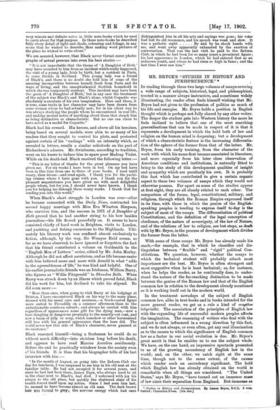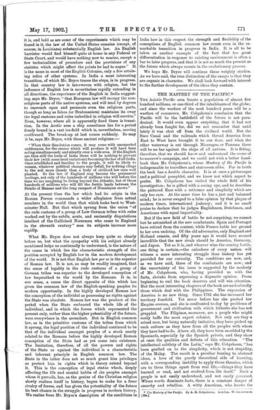MR. BRYCE'S " STUDIES IN HISTORY AND JURISPRUDENCE." *
In reading through these two large volumes of essays covering a wide range of subjects, historical, legal, and philosophical, treated in a manner always instructive, and sometimes widely illuminating, the reader often finds himself wishing that Mr. Bryce had not given to the profession of politics so much of his life and energies. Mr. Bryce holds a position in English thought which is perhaps not fully shared by any other writer. The deeper the student gets into Western history the more he feels inclined to believe that one of the most searching generalisations that can be made in respect of it is that it represents a development in which the hold both of law and religion on the human mind is deepening; but a development of which a characteristic feature is the increasing differentia- tion of the sphere of the former from that of the latter. Mr. Bryce, from his early training, from the character of the work with which his name first became associated in literature, and more especially from his later close observation of American conditions and institutions, is naturally fitted to bring to the study of this development qualities of insight and sympathy which are peculiarly his own. It is probably this fact which has contributed to give a certain organic aspect to these two volumes of essays which they would not otherwise possess. Far apart as some of the studies appear at first sight, they are all closely related to each other. The comparison of the forms, legal, constitutional, military, and religious, through which the Roman Empire expressed itself in its time, with those in which the genius of the English- speaking peoples is tending to express itself to-day is the subject of most of the essays. The differentiation of political Constitutions, and the definition of the legal conception of obedience, of the nature of sovereignty, of the law of Nature, and of the relations of law to religion, are but steps, as dealt with by Mr. Bryce, in the process of development which divides the former from the latter.
With some of these essays Mr. Bryce has already made his mark,—for example, that in which he classifies and dis- tinguishes between " flexible " and " rigid " political Con- stitutions. We question, however, whether the essays to which the technical student will probably attach most importance are the best. Mr. Bryce is often strongest and most suggestive when he is least technical; as, for instance, when he helps the reader, as he continually does, to under- stand the nature of the far-reaching distinction to be made between the genius of the Roman law and that of the English common law in relation to the development already mentioned as it is working itself out in the modern world.
In the treatment nowadays of the subject of Raglish common law, alike in text-books and in books intended for the more general reader, we get as a rule a kind of Inugitus labyrinthi. The association of the principles of English law with the expanding life of successful modern peoples affects the imagination. The reasoning of writers who deal with the subject is often influenced in a wrong direction by this fact, and we do not always, or even often, get any real illumination as to the causes to which the significance of English common law as a factor in our social evolution is due. Mr. Bryce's great merit is that he enables us to see the subject whole. We have, on the one hand, an impressive spectacle presented to us of the growing ascendency of English law in the world ; and, on the other, we catch sight at the same time, though not to the same extent, of the causes which render such an ascendency significant. The hold which English law has already obtained on the world is remarkable when all things are considered. " The United States," says Mr. Bryce, " have turned out an immense mass of law since their separation from England. But immense as
• Studies in History and Jurisprudence. By James Bryce, D.C.L. 2 yob. Oxford: Clarendon Press. 125*. net.]
it is, and bold as are some of the experiments which may be found in it, the law of the United States remains (except, of course, in Louisiana) substantially English law. An English barrister would find himself quite at home in any Federal or State Court, and would have nothing new to master, except a few technicalities of procedure and the provisions of any statutes which might affect the points he had to argue." It is the same in most of the English Colonies, only a few retain- ing relics of other systems. In India a most interesting transition, of which Mr. Bryce traces the steps, is in progress. In that country law is interwoven with religion, but the influence of English law is nevertheless rapidly extending in all directions, the experience of the English in India suggest- ing, says Mr. Bryce, that European law will occupy the non- religious parts of the native systems, and will tend by degrees to encroach upon and permeate even the religious parts, though so long as Islam (or Brahmanism) maintains its sway the legal customs and rules imbedded in religion will survive." Even, however, where all is apparently fixed there is transi- tion. In the Arctic seas a ship sometimes lies for a period firmly bound in a vast ice-field which is, nevertheless, moving southward. The break-up at last comes suddenly. So may it be, says Mr. Bryce, with these ancient religions When their dissolution comes, it may come with unexpected suddenness, for the causes which will produce it will have been acting simultaneously and silently over a wide area. If the English are then still the lords of India there will be nothing to prevent their law (with some local variations) becoming the law of all India. Once established and familiar to the people, it will be likely to remain, whatever political changes may befall, for nothing clings to the soil more closely than a body of civilised law once well planted. So the law of England may become the permanent heritage, not only of the hundreds of millions who will before the time we are imagining be living beyond the Atlantic, but of those hundreds of millions who will fill the fertile lands between the Straits of Mannar and the long rampart of Himalayan snows."
At the present time the law which had its origin in the Roman Forum commands a wider allegiance from actual numbers in the world than that which looks back to West- minster Hall. But that which sprung from the union " of the rude customs of a group of Low German tribes with rules worked out by the subtle, acute, and eminently disputatious intellect of the Gallicised Norsemen who came to England in the eleventh century" sees its subjects increase more rapidly.
What Mr. Bryce does not always keep quite so clearly before us, but what the sympathy with his subject already mentioned helps us continually to understand, is the nature of
the cause in which lies the characteristic strength of the position occupied by English law in the modern development of the world. It is not that English law per se is the superior of Roman law. It is not, as may be readily imagined, that the sense of legality in the rude customs of a group of
German tribes was superior to the developed conception of law bequeathed to the world by the Romans. It is, in
one sense, a cause the direct opposite of this which has given the common law of the English-speaking peoples its modern opportunity. In the highly developed Roman law the conception of the individul as possessing no rights against the State was absolute. Roman law was the product of the period when the State embraced the whole life of the individual, and in which the forces which represented the present only, rather than the higher potentiality of the future, were everywhere in the ascendant. But in English common law, as in the primitive customs of the tribes from which it sprung, the legal position of the individual continued to be that of the individual amongst peoples of a stock nearly related to the Romans before the highly developed Roman conception of the State had as yet come into existence. The limitation, therefore, of all the powers and rights of the State as against the individual is a characteristic and inherent principle in English common law. The State in the latter does not so much grant him privileges as protect Lim in rights which in theory extend beyond it. This is the conception of legal status which, deeply affecting the life and mental habits of die peoples amongst whom it prey ails, has, as the genies of the Christian religion slowly realises itself in history, begun to make for a freer rivalry of forces, and has given the potentiality of the future its best chance in the struggle in progress in modern history. We realise from Mr. Bryce's description of the conditions in
India how in this respect the strength and flexibility of the conceptions of English common law count even in the re- markable transition in progress in India. It is all to be taken as another example of the fact that too great differentiation in response to existing environment is often a bar to later progress, and that it is not so much the present as the future which always counts in the evolutionary process.
We hope Mr. Bryce will continue these weighty studies. As we have said, the true distinction of the essays is that they are organic in character. We shall look forward with interest to the further development of the ideas they contain.







































 Previous page
Previous page